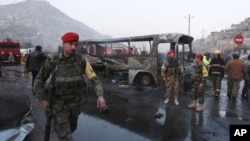Taliban militants killed at least 23 people in gun and suicide attacks in Afghanistan in recent days, underlining security concerns just weeks before most international forces withdraw from the country.
In southern Afghanistan on Saturday, militants on motorbikes shot and killed 12 workers who were clearing land mines in Helmand province, prompting a firefight with police.
The Reuters news agency reported that four attackers were killed in the firefight and three more were captured.
Earlier in the day, Afghan police said gunmen shot and killed a senior official of Afghanistan's Supreme Court, Atiqullah Rawoofi, near his home in a suburb of the capital, Kabul. The Taliban claimed responsibility for killing Rawoofi but did not say why he was attacked.
Also in Kabul, an explosion destroyed a bus carrying Afghan army personnel, killing at least seven people and wounding more than a dozen others.
Separately, the international coalition said Saturday a Taliban attack near the U.S. Bagram airfield north of Kabul on Friday killed two NATO soldiers, both Americans.
Taliban insurgents said they also were behind Thursday’s suicide bombing that killed a German citizen in a French cultural center in Kabul during a performance of a play that denounced suicide attacks.
Critics say President Ashraf Ghani's government urgently needs to devise a peace and reconciliation policy to bring an end to the Taliban insurgency.
Kate Clark, a senior researcher at Kabul-based Afghanistan Analysts Network, said Ghani "needs to have a government before he could start reaching out for reconciliation. He needs to get the appointments sorted out: who is the defense minister, who is the head of the NDS [National Directorate of Security], who is the minister of interior, who are the leading army commanders and the police commanders. You can’t really do much until you have got a Cabinet together.”
Ghani is leading the government with his election rival, Abdullah Abdullah, appointed as Afghanistan's chief executive to share power with him. But differences between the two men over sharing Cabinet slots have prevented formation of a consensus Cabinet since they were sworn into office two months ago.
The unprecedented fatalities and injuries among Afghan security forces this year have raised questions about their ability to deal with the Taliban insurgency.
While addressing a conference of NATO foreign ministers in Brussels this month, Ghani admitted Afghanistan would need continued financial and military support.
"We are not yet able to do everything alone," he said. "Your continued support will therefore be key in ensuring our collective gains of the last 13 years will be enduring. Specifically, we need your help to build the processes and systems necessary to ensure the long-term sustainability of our forces.”
Security agreements that Ghani signed with the United States and NATO soon after taking office will allow the deployment of around 13,000 foreign soldiers, mostly Americans, to continue in Afghanistan after the current combat mission ends. The residual force will primarily assist and advise Afghan security personnel.
The Taliban cite the security agreements as the reason for their stepped-up attacks.




